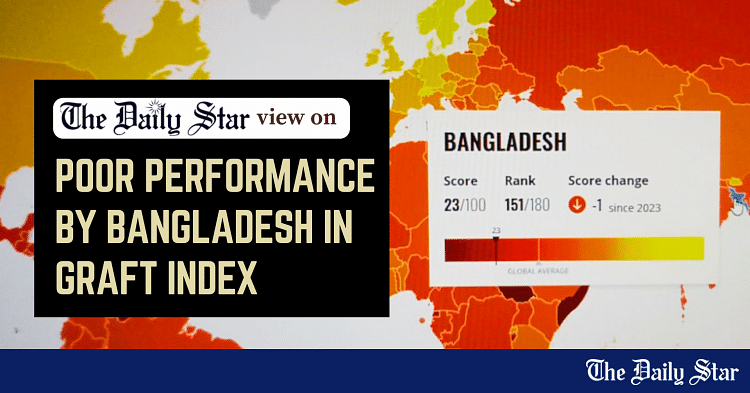Saif
Senior Member
- Joined
- Jan 24, 2024
- Messages
- 16,073
- Likes
- 8,056
- Nation

- Axis Group


Mega corruption in megaprojects
The system that allowed this must be fixed

Despite corruption being prevalent under the previous regime, the extent of it in regards to eight mega projects is shocking. According to a report by a government-formed task force, the costs of these projects—Padma Bridge, Padma Bridge Rail Link, Jamuna Railway Bridge, Dhaka-Mawa Expressway, Bangabandhu Tunnel, Dhaka Metro Rail Line-6, Terminal 3 of Hazrat Shahjalal International Airport, and BRT Line-3—rose by a staggering 68 percent, or $7.52 billion, from the initial estimates. Initially, the total estimated cost of these projects was $11.2 billion, but it eventually surged to $18.64 billion, primarily due to poor and faulty feasibility studies, corruption, and delays in project initiation.
The task force has also identified several other factors contributing to cost overruns, including delays in land acquisition, a prolonged and corrupt land valuation process, misuse of acquired land, and conflicts with other projects. Consequently, while these mega projects have been completed, their success has come at a hefty price—both in terms of time and resources—leading to substantial resource wastage. The report found that such megaprojects are often formulated through a top-down approach, heavily influenced by political and external factors. Project ideas are typically conceived by ministers, influential politicians, ministries, secretaries, and donors before being presented to the prime minister for approval. Once approved, the project is handed over to the relevant ministry for feasibility studies and proposal preparation, with instructions for swift implementation. However, these projects often do not align with the relevant department's master plan or priorities. Moreover, feasibility studies are frequently treated as a mere formality, with a tendency to exaggerate project benefits and underestimate costs. Land acquisition, which typically begins during the project implementation phase, is also plagued by corruption, inefficiencies, and delays in valuation and compensation assessment.
It has been found that foreign government-funded projects often incur high construction costs due to direct procurement methods and non-competitive bidding practices. For instance, India's lines of credit, intended to support Bangladesh's development, come with stringent conditions—one being that 75 percent of project content must be sourced from India. This restriction limits Bangladesh's procurement flexibility, often resulting in inflated costs and compromised quality.
In addition to these megaprojects, the Awami League government undertook numerous other projects during its tenure, many of which underwent frequent revisions, leading to delays and cost escalations. Ultimately, it is the people of Bangladesh who bear the burden of such massive corruption and inefficiency.
Moving forward, ensuring transparency and accountability in all development projects is crucial. The task force committee has made two key recommendations. First, the Planning Commission should have the authority to appraise, approve, coordinate, and oversee all public projects. Second, all four modes of transport should be brought under a single ministry, potentially the transport ministry. The government should seriously consider these proposals and implement systemic reforms to ensure that public projects genuinely serve the public interest.
The system that allowed this must be fixed
Despite corruption being prevalent under the previous regime, the extent of it in regards to eight mega projects is shocking. According to a report by a government-formed task force, the costs of these projects—Padma Bridge, Padma Bridge Rail Link, Jamuna Railway Bridge, Dhaka-Mawa Expressway, Bangabandhu Tunnel, Dhaka Metro Rail Line-6, Terminal 3 of Hazrat Shahjalal International Airport, and BRT Line-3—rose by a staggering 68 percent, or $7.52 billion, from the initial estimates. Initially, the total estimated cost of these projects was $11.2 billion, but it eventually surged to $18.64 billion, primarily due to poor and faulty feasibility studies, corruption, and delays in project initiation.
The task force has also identified several other factors contributing to cost overruns, including delays in land acquisition, a prolonged and corrupt land valuation process, misuse of acquired land, and conflicts with other projects. Consequently, while these mega projects have been completed, their success has come at a hefty price—both in terms of time and resources—leading to substantial resource wastage. The report found that such megaprojects are often formulated through a top-down approach, heavily influenced by political and external factors. Project ideas are typically conceived by ministers, influential politicians, ministries, secretaries, and donors before being presented to the prime minister for approval. Once approved, the project is handed over to the relevant ministry for feasibility studies and proposal preparation, with instructions for swift implementation. However, these projects often do not align with the relevant department's master plan or priorities. Moreover, feasibility studies are frequently treated as a mere formality, with a tendency to exaggerate project benefits and underestimate costs. Land acquisition, which typically begins during the project implementation phase, is also plagued by corruption, inefficiencies, and delays in valuation and compensation assessment.
It has been found that foreign government-funded projects often incur high construction costs due to direct procurement methods and non-competitive bidding practices. For instance, India's lines of credit, intended to support Bangladesh's development, come with stringent conditions—one being that 75 percent of project content must be sourced from India. This restriction limits Bangladesh's procurement flexibility, often resulting in inflated costs and compromised quality.
In addition to these megaprojects, the Awami League government undertook numerous other projects during its tenure, many of which underwent frequent revisions, leading to delays and cost escalations. Ultimately, it is the people of Bangladesh who bear the burden of such massive corruption and inefficiency.
Moving forward, ensuring transparency and accountability in all development projects is crucial. The task force committee has made two key recommendations. First, the Planning Commission should have the authority to appraise, approve, coordinate, and oversee all public projects. Second, all four modes of transport should be brought under a single ministry, potentially the transport ministry. The government should seriously consider these proposals and implement systemic reforms to ensure that public projects genuinely serve the public interest.











































